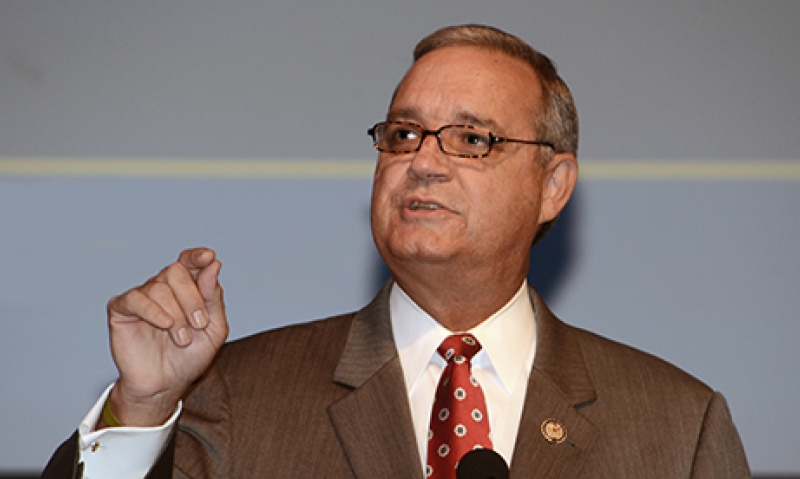
Veteran-job bills closer to House floor
During a markup session on Sept. 8, the House Veterans' Affairs Committee affirmed its support of several bills favored strongly by The American Legion. Markup is the process of debating, amending and rewriting proposed legislation, then recommending it to the House floor for a vote on passage.
Among the proposed laws examined during the committee hearing was H.R. 2433, the Veterans Opportunity to Work Act of 2011 (the VOW Act) introduced by committee chair Rep. Jeff Miller of Florida this past July. Miller explained the bill in greater detail during the Legion's93rd annual convention last month in Minneapolis - a conference that concentrated heavily on the high unemployment rate among veterans.
Miller said, in part, "The VOW Act has five pillars: First, we must enhance the Transition Assistance Program (TAP), which provides career counseling. TAP will be mandatory for all separating servicemembers. Second, we need to make sure our Vietnam, Cold War and Persian Gulf-era veterans also have opportunities to advance in the workplace. Therefore, 100,000 veterans of past eras can receive up to one year of Montgomery GI Bill (education) benefits to retrain for careers in this new and ever-changing marketplace." The extension of educational benefits to older veterans was encouraged by The American Legion.
In his convention remarks, Miller continued, "Third, we will strengthen the protections provided by the Uniformed Services Employment and Reemployment Rights Act. Fourth, the inability (for some skilled veterans) to be credentialed or licensed in their equivalent civilian field when they return home prevents these men and women from obtaining meaningful and gainful employment in their area of expertise. I have been working with several governors and governors' associations, as well as the Department of Labor, to create uniform standards to ease this transition from active duty to civilian life."
The process of easing servicemembers' transition from active duty to civilian life is an issue important to The American Legion and also the subject of a planned "summit" of industry and government experts to be hosted by the Legion early next year.
"And lastly," Miller said, "I have introduced a bill providing meaningful tax incentives for small businesses that hire unemployed veterans. And as important as its other features, the VOW Act does not increase the deficit one penny."
Miller's bill also helps sustain a key veterans' program in a less obvious manner. The bill continues certain fees for the veterans' home loan program which have helped keep that program fiscally solvent. The program is vital to the stability of the home loan market, in that veterans' home loans have the lowest foreclosure rate of any such program.
Another key piece of legislation considered by the committee and favored strongly by The American Legion is H.R. 2074, the Veterans Sexual Assault Prevention Act, which was recently introduced by Rep. Ann Marie Buerkle of New York. This proposed law would require a comprehensive policy on reporting and tracking sexual assault incidents and other safety incidents that occur at VA medical facilities.
In mid-June, Verna Jones, director of the Legion's National Veterans Affairs and Rehabilitation Commission, testified before a House Veterans' Affairs subcommittee on the subject of "Preventing Sexual Assaults and Safety Incidents at VA Facilities."
Responding to a GAO report noting an alarming level of sexual assault activity within VA facilities, Jones said, "What is needed is a clearly dictated policy made transparent to employees and the public at all levels, increased scrutiny at a ground floor level to ensure operations are complying with the stated mission, and accountability for those employees who fail to meet the standards. Put simply, hold individuals accountable for their actions, and make clear in no uncertain terms that this kind of behavior will not be tolerated."
Buerkle's bill, Jones said, "provides for exactly the sort of concise and clear definitions and consistent policy required to help right the ship of VA's treatment of these matters. The American Legion supports this legislation."
Other legislation recommended by the committee for movement to the House floor included H.R. 2302 from Rep. Marlin Stutzman of Indiana. This legislation calls for increased transparency from the VA and other agencies on some matters, including better reporting from the Department of Labor on employment of veterans by contractors and H.R. 1263, The Servicemembers Civil Relief Act (SCRA).
H.R. 1263, from ranking member Bob Filner of California,extends the protections of the SCRA on mortgages to their surviving spouses for a period of five years after a servicemember's or veteran's death. This represents much-needed protection for widows and widowers for their mortgages, the same protections already extended to their servicemember spouses.
